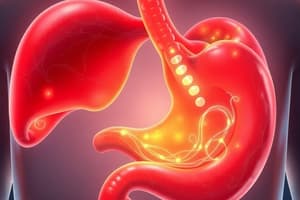Podcast
Questions and Answers
What is the primary cause of gastroesophageal reflux disease (GERD)?
What is the primary cause of gastroesophageal reflux disease (GERD)?
- Relaxation of the lower esophageal sphincter (correct)
- Esophageal muscle spasms
- Increased pressure in the stomach
- Overproduction of stomach acid
Which symptom is NOT typically associated with GERD?
Which symptom is NOT typically associated with GERD?
- Dysphagia
- Heartburn
- Regurgitation
- Nausea after meals (correct)
Which factor contributes to the development of GERD symptoms by allowing acid to flow back into the esophagus?
Which factor contributes to the development of GERD symptoms by allowing acid to flow back into the esophagus?
- Anatomical changes in the esophagus
- Excessive intake of spicy foods
- Weakening of abdominal muscles
- Incompetent lower esophageal sphincter (LES) (correct)
What is the relationship between the lower esophageal sphincter (LES) and GERD severity?
What is the relationship between the lower esophageal sphincter (LES) and GERD severity?
What are the typical symptoms of GERD that all patients will experience?
What are the typical symptoms of GERD that all patients will experience?
Flashcards
Primary cause of GERD?
Primary cause of GERD?
Relaxation or weakening of the lower esophageal sphincter (LES), allowing stomach acid to flow back into the esophagus.
Incompetent LES and GERD?
Incompetent LES and GERD?
Incompetence of this sphincter allows stomach acid to reflux into the esophagus, leading to GERD symptoms.
Typical GERD Symptoms?
Typical GERD Symptoms?
Heartburn and regurgitation are the most common indications of GERD.
LES and GERD?
LES and GERD?
Signup and view all the flashcards
Study Notes
Gastroesophageal Reflux Disease (GERD)
- GERD is caused by stomach contents entering the esophagus due to the relaxation of the lower esophageal sphincter (LES).
- The flow of chyme from the stomach into the esophagus leads to inflammation, resulting in reflux esophagitis.
- GERD is commonly caused by an incompetent LES, hiatal hernia, gastroparesis, and obesity.
- The LES is crucial in preventing GERD symptoms.
- A weakened LES allows acid to flow from the stomach into the esophagus, resulting in a burning sensation.
- The weaker the LES tone, the more severe the reflux.
- The LES is not a true anatomical sphincter, but consists of smooth muscles in the distal esophagus that close and open during swallowing.
- Repeated opening of the LES over time allows stomach contents to enter the esophagus, leading to burning sensations.
- In GERD, the LES is never fully closed.
- Typical Symptoms of GERD:
- Heartburn: a burning sensation in the chest, often occurring after eating or at night, worse when lying down or bending over.
- Regurgitation: sour or bitter-tasting fluid backing up into the throat or mouth.
- Dysphagia: difficulty swallowing.
Studying That Suits You
Use AI to generate personalized quizzes and flashcards to suit your learning preferences.




